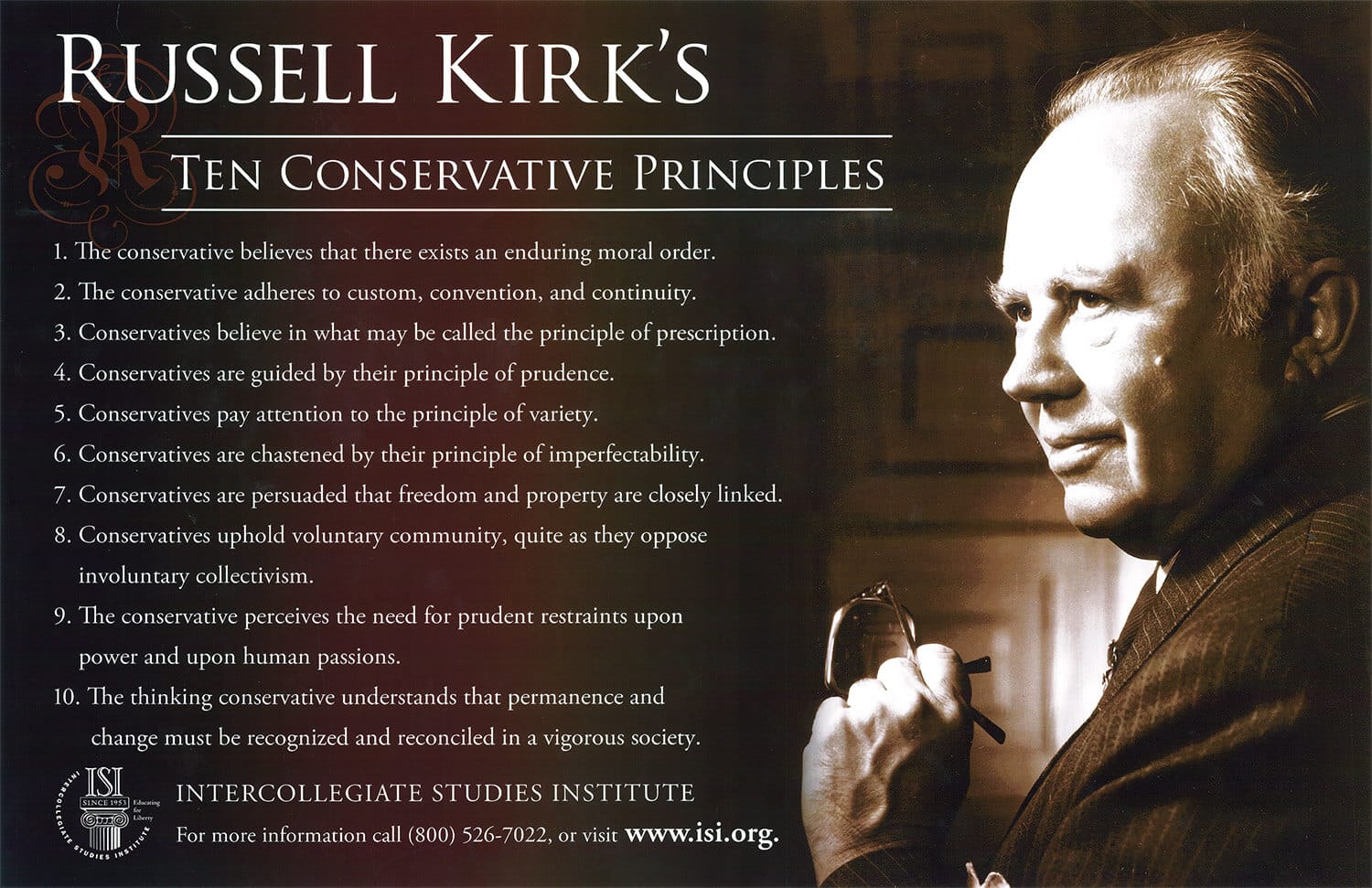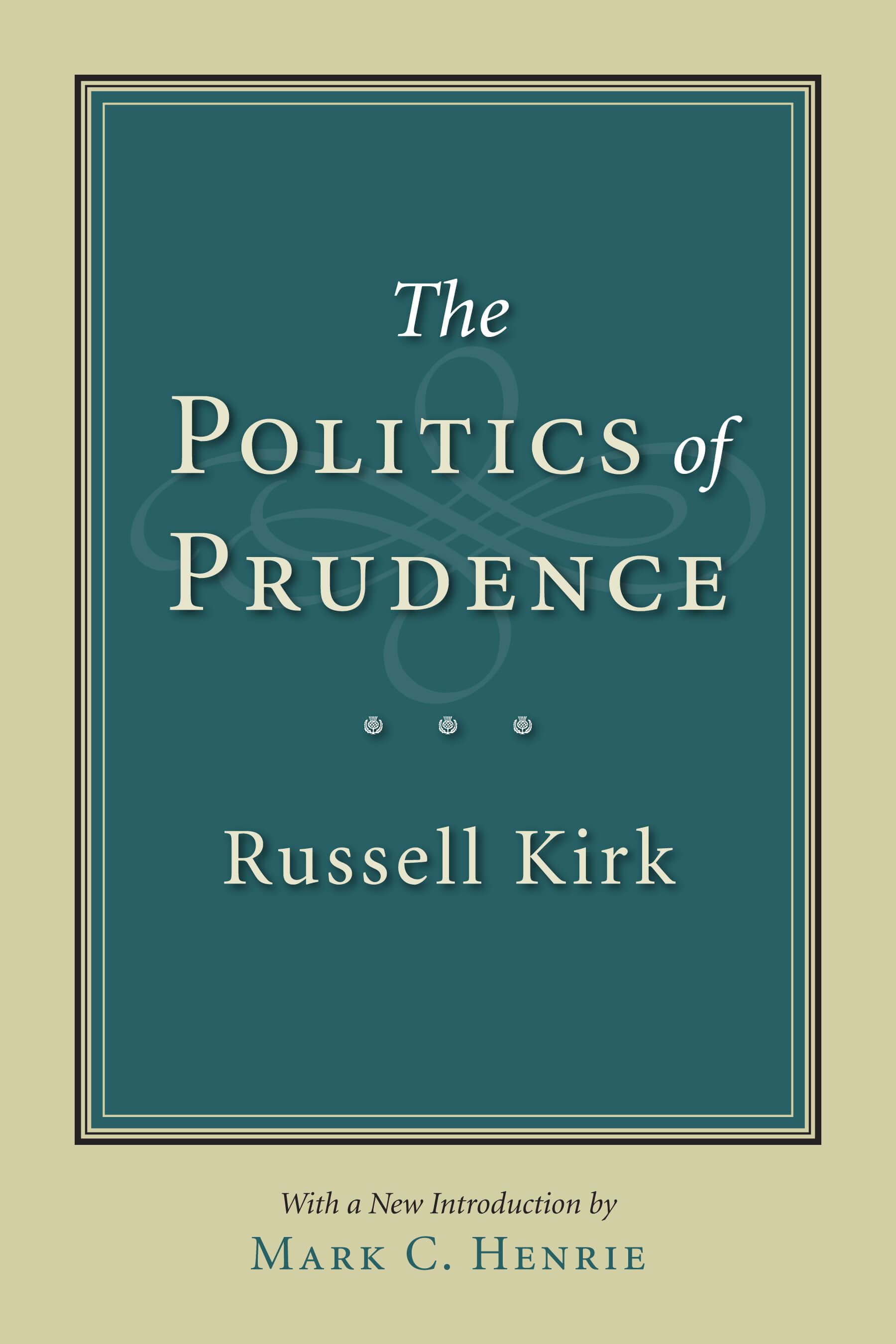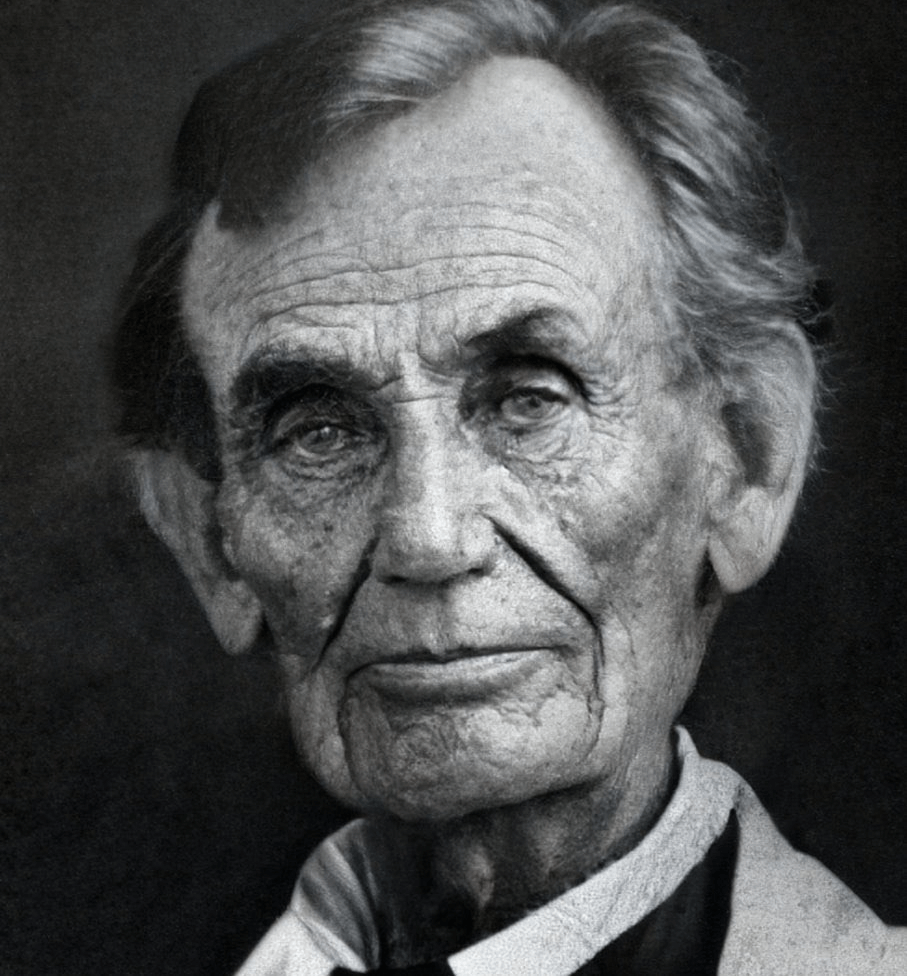Conservatism is not a fixed ideology or a rigid set of policy positions, talking points, or dogmata. Still, certain foundational principles unite conservatives, as Modern Age founder Russell Kirk shows in this timeless piece, which is excerpted from his book The Politics of Prudence.
Being neither a religion nor an ideology, the body of opinion termed conservatism possesses no Holy Writ and no Das Kapital to provide dogmata. So far as it is possible to determine what conservatives believe, the first principles of the conservative persuasion are derived from what leading conservative writers and public men have professed during the past two centuries. After some introductory remarks on this general theme, I will proceed to list ten such conservative principles.
A witty presidential candidate of recent times, Mr. Eugene McCarthy, remarked publicly in 1985 that nowadays he employs the word “liberal” as an adjective merely. That renunciation of “liberal” as a noun of politics, a partisan or ideological tag, is some measure of the triumph of the conservative mentality during the 1980s—including the triumph of the conservative side of Mr. McCarthy’s own mind and character.
Perhaps it would be well, most of the time, to use this word “conservative” as an adjective chiefly. For there exists no Model Conservative, and conservatism is the negation of ideology: it is a state of mind, a type of character, a way of looking at the civil social order.
The attitude we call conservatism is sustained by a body of sentiments, rather than by a system of ideological dogmata. It is almost true that a conservative may be defined as a person who thinks himself such. The conservative movement or body of opinion can accommodate a considerable diversity of views on a good many subjects, there being no Test Act or Thirty-Nine Articles of the conservative creed.
In essence, the conservative person is simply one who finds the permanent things more pleasing than Chaos and Old Night. (Yet conservatives know, with Burke, that healthy “change is the means of our preservation.”) A people’s historic continuity of experience, says the conservative, offers a guide to policy far better than the abstract designs of coffee-house philosophers. But of course there is more to the conservative persuasion than this general attitude.
It is not possible to draw up a neat catalogue of conservatives’ convictions; nevertheless, I offer you, summarily, ten general principles; it seems safe to say that most conservatives would subscribe to most of these maxims. In various editions of my book The Conservative Mind I have listed certain canons of conservative thought—the list differing somewhat from edition to edition; in my anthology The Portable Conservative Reader I offer variations upon this theme. Now I present to you a summary of conservative assumptions differing somewhat from my canons in those two books of mine. In fine, the diversity of ways in which conservative views may find expression is itself proof that conservatism is no fixed ideology. What particular principles conservatives emphasize during any given time will vary with the circumstances and necessities of that era. The following ten articles of belief reflect the emphases of conservatives in America nowadays.
• First, the conservative believes that there exists an enduring moral order. That order is made for man, and man is made for it: human nature is a constant, and moral truths are permanent.
This word order signifies harmony. There are two aspects or types of order: the inner order of the soul, and the outer order of the commonwealth. Twenty-five centuries ago, Plato taught this doctrine, but even the educated nowadays find it difficult to understand. The problem of order has been a principal concern of conservatives ever since conservative became a term of politics.
Our twentieth-century world has experienced the hideous consequences of the collapse of belief in a moral order. Like the atrocities and disasters of Greece in the fifth century before Christ, the ruin of great nations in our century shows us the pit into which fall societies that mistake clever self-interest, or ingenious social controls, for pleasing alternatives to an oldfangled moral order.
It has been said by liberal intellectuals that the conservative believes all social questions, at heart, to be questions of private morality. Properly understood, this statement is quite true. A society in which men and women are governed by belief in an enduring moral order, by a strong sense of right and wrong, by personal convictions about justice and honor, will be a good society—whatever political machinery it may utilize; while a society in which men and women are morally adrift, ignorant of norms, and intent chiefly upon gratification of appetites, will be a bad society—no matter how many people vote and no matter how liberal its formal constitution may be. For confirmation of the latter argument, we have merely to glance at the unhappy District of Columbia.
• Second, the conservative adheres to custom, convention, and continuity. It is old custom that enables people to live together peaceably; the destroyers of custom demolish more than they know or desire. It is through convention—a word much abused in our time—that we contrive to avoid perpetual disputes about rights and duties: law at base is a body of conventions. Continuity is the means of linking generation to generation; it matters as much for society as it does for the individual; without it, life is meaningless. When successful revolutionaries have effaced old customs, derided old conventions, and broken the continuity of social institutions—why, presently they discover the necessity of establishing fresh customs, conventions, and continuity; but that process is painful and slow; and the new social order that eventually emerges may be much inferior to the old order that radicals overthrew in their zeal for the Earthly Paradise.
Conservatives are champions of custom, convention, and continuity because they prefer the devil they know to the devil they don’t know. Order and justice and freedom, they believe, are the artificial products of a long social experience, the result of centuries of trial and reflection and sacrifice. Thus the body social is a kind of spiritual corporation, comparable to the church; it may even be called a community of souls. Human society is no machine, to be treated mechanically. The continuity, the life-blood, of a society must not be interrupted. Burke’s reminder of the necessity for prudent change is in the mind of the conservative. But necessary change, conservatives argue, ought to be gradual and discriminatory, never unfixing old interests at once.
• Third, conservatives believe in what may be called the principle of prescription. Conservatives sense that modem people are dwarfs on the shoulders of giants, able to see farther than their ancestors only because of the great stature of those who have preceded us in time. Therefore conservatives very often emphasize the importance of prescription—that is, of things established by immemorial usage, so that the mind of man runneth not to the contrary. There exist rights of which the chief sanction is their antiquity—including rights to property, often. Similarly, our morals are prescriptive in great part. Conservatives argue that we are unlikely, we moderns, to make any brave new discoveries in morals or politics or taste. It is perilous to weigh every passing issue on the basis of private judgment and private rationality. The individual is foolish, but the species is wise, Burke declared. In politics we do well to abide by precedent and precept and even prejudice, for the great mysterious incorporation of the human race has acquired a prescriptive wisdom far greater than any man’s petty private rationality.
• Fourth, conservatives are guided by their principle of prudence. Burke agrees with Plato that in the statesman, prudence is chief among virtues. Any public measure ought to be judged by its probable long-run consequences, not merely by temporary advantage or popularity. Liberals and radicals, the conservative says, are imprudent: for they dash at their objectives without giving much heed to the risk of new abuses worse than the evils they hope to sweep away. As John Randolph of Roanoke put it, Providence moves slowly, but the devil always hurries. Human society being complex, remedies cannot be simple if they are to be efficacious. The conservative declares that he acts only after sufficient reflection, having weighed the consequences. Sudden and slashing reforms are as perilous as sudden and slashing surgery.
• Fifth, conservatives pay attention to the principle of variety. They feel affection for the proliferating intricacy of longestablished social institutions and modes of life, as distinguished from the narrowing uniformity and deadening egalitarianism of radical systems. For the preservation of a healthy diversity in any civilization, there must survive orders and classes, differences in material condition, and many sorts of inequality. The only true forms of equality are equality at the Last Judgment and equality before a just court of law; all other attempts at leveling must lead, at best, to social stagnation. Society requires honest and able leadership; and if natural and institutional differences are destroyed, presently some tyrant or host of squalid oligarchs will create new forms of inequality.
• Sixth, conservatives are chastened by their principle of imperfectibility. Human nature suffers irremediably from certain grave faults, the conservatives know. Man being imperfect, no perfect social order ever can be created. Because of human restlessness, mankind would grow rebellious under any utopian domination, and would break out once more in violent discontent—or else expire of boredom. To seek for utopia is to end in disaster, the conservative says: we are not made for perfect things. All that we reasonably can expect is a tolerably ordered, just, and free society, in which some evils, maladjustments, and suffering will continue to lurk. By proper attention to prudent reform, we may preserve and improve this tolerable order. But if the old institutional and moral safeguards of a nation are neglected, then the anarchic impulse in humankind breaks loose: “the ceremony of innocence is drowned.” The ideologues who promise the perfection of man and society have converted a great part of the twentieth-century world into a terrestrial hell.
• Seventh, conservatives are persuaded that freedom and property are closely linked. Separate property from private possession, and Leviathan becomes master of all. Upon the foundation of private property, great civilizations are built. The more widespread is the possession of private property, the more stable and productive is a commonwealth. Economic leveling, conservatives maintain, is not economic progress. Getting and spending are not the chief aims of human existence; but a sound economic basis for the person, the family, and the commonwealth is much to be desired.
Sir Henry Maine, in his Village Communities, puts strongly the case for private property, as distinguished from communal property: “Nobody is at liberty to attack several property and to say at the same time that he values civilization. The history of the two cannot be disentangled.” For the institution of several property—that is, private property—has been a powerful instrument for teaching men and women responsibility, for providing motives to integrity, for supporting general culture, for raising mankind above the level of mere drudgery, for affording leisure to think and freedom to act. To be able to retain the fruits of one’s labor; to be able to see one’s work made permanent; to be able to bequeath one’s property to one’s posterity; to be able to rise from the natural condition of grinding poverty to the security of enduring accomplishment; to have something that is really one’s own—these are advantages difficult to deny. The conservative acknowledges that the possession of property fixes certain duties upon the possessor; he accepts those moral and legal obligations cheerfully.
• Eighth, conservatives uphold voluntary community, quite as they oppose involuntary collectivism. Although Americans have been attached strongly to privacy and private rights, they also have been a people conspicuous for a successful spirit of community. In a genuine community, the decisions most directly affecting the lives of citizens are made locally and voluntarily. Some of these functions are carried out by local political bodies, others by private associations: so long as they are kept local, and are marked by the general agreement of those affected, they constitute healthy community. But when these functions pass by default or usurpation to centralized authority, then community is in serious danger. Whatever is beneficent and prudent in modern democracy is made possible through cooperative volition. If, then, in the name of an abstract Democracy, the functions of community are transferred to distant political direction—why, real government by the consent of the governed gives way to a standardizing process hostile to freedom and human dignity.
For a nation is no stronger than the numerous little communities of which it is composed. A central administration, or a corps of select managers and civil servants, however well intentioned and well trained, cannot confer justice and prosperity and tranquility upon a mass of men and women deprived of their old responsibilities. That experiment has been made before; and it has been disastrous. It is the performance of our duties in community that teaches us prudence and efficiency and charity.
• Ninth, the conservative perceives the need for prudent restraints upon power and upon human passions. Politically speaking, power is the ability to do as one likes, regardless of the wills of one’s fellows. A state in which an individual or a small group are able to dominate the wills of their fellows without check is a despotism, whether it is called monarchical or aristocratic or democratic. When every person claims to be a power unto himself, then society falls into anarchy. Anarchy never lasts long, being intolerable for everyone, and contrary to the ineluctable fact that some persons are more strong and more clever than their neighbors. To anarchy there succeeds tyranny or oligarchy, in which power is monopolized by a very few.
The conservative endeavors to so limit and balance political power that anarchy or tyranny may not arise. In every age, nevertheless, men and women are tempted to overthrow the limitations upon power, for the sake of some fancied temporary advantage. It is characteristic of the radical that he thinks of power as a force for good—so long as the power falls into his hands. In the name of liberty, the French and Russian revolutionaries abolished the old restraints upon power; but power cannot be abolished; it always finds its way into someone’s hands. That power which the revolutionaries had thought oppressive in the hands of the old regime became many times as tyrannical in the hands of the radical new masters of the state.
Knowing human nature for a mixture of good and evil, the conservative does not put his trust in mere benevolence. Constitutional restrictions, political checks and balances, adequate enforcement of the laws, the old intricate web of restraints upon will and appetite—these the conservative approves as instruments of freedom and order. A just government maintains a healthy tension between the claims of authority and the claims of liberty.
• Tenth, the thinking conservative understands that permanence and change must be recognized and reconciled in a vigorous society. The conservative is not opposed to social improvement, although he doubts whether there is any such force as a mystical Progress, with a Roman P, at work in the world. When a society is progressing in some respects, usually it is declining in other respects. The conservative knows that any healthy society is influenced by two forces, which Samuel Taylor Coleridge called its Permanence and its Progression. The Permanence of a society is formed by those enduring interests and convictions that gives us stability and continuity; without that Permanence, the fountains of the great deep are broken up, society slipping into anarchy. The Progression in a society is that spirit and that body of talents which urge us on to prudent reform and improvement; without that Progression, a people stagnate.
Therefore the intelligent conservative endeavors to reconcile the claims of Permanence and the claims of Progression. He thinks that the liberal and the radical, blind to the just claims of Permanence, would endanger the heritage bequeathed to us, in an endeavor to hurry us into some dubious Terrestrial Paradise. The conservative, in short, favors reasoned and temperate progress; he is opposed to the cult of Progress, whose votaries believe that everything new necessarily is superior to everything old.
Change is essential to the body social, the conservative reasons, just as it is essential to the human body. A body that has ceased to renew itself has begun to die. But if that body is to be vigorous, the change must occur in a regular manner, harmonizing with the form and nature of that body; otherwise change produces a monstrous growth, a cancer, which devours its host. The conservative takes care that nothing in a society should ever be wholly old, and that nothing should ever be wholly new. This is the means of the conservation of a nation, quite as it is the means of conservation of a living organism. Just how much change a society requires, and what sort of change, depend upon the circumstances of an age and a nation.
Such, then, are ten principles that have loomed large during the two centuries of modern conservative thought. Other principles of equal importance might have been discussed here: the conservative understanding of justice, for one, or the conservative view of education. But such subjects, time running on, I must leave to your private investigation.
Who affirms those ten conservative principles nowadays? In practical politics, commonly a body of general convictions is linked with a body of interests. Marxists argue, indeed, that professed political principle is a mere veil for advancement of the economic interests of a class or faction: that is, no real principle exists—merely ideology. Such is not my view: but we ought to recognize connections between political doctrines and social or economic interest groups, when such connections exist; they may be innocent enough, or they may make headway at the expense of the general public interest. What interest or group of interests back the conservative element in American politics?
That question is not readily answered. Many rich Americans endorse liberal or radical causes; affluent suburbs frequently vote for liberal men and measures; attachment to conservative sentiments does not follow the line that Marxist analysts of politics expect to find. The owners of small properties, as a class, tend to be more conservative than do the possessors of much property (this latter often in the abstract form of stocks and bonds). One may remark that most conservatives hold religious convictions; yet the officers of mainline Protestant churches, together with church bureaucracies, frequently ally themselves with radical organizations; while some curious political affirmations have been heard recently among the Catholic hierarchy. Half a century ago, it might have been said that most college professors were conservative; that could not be said truthfully today; yet physicians, lawyers, dentists, and other professional people—or most of them—subscribe to conservative journals and generally vote for persons they take to be conservative candidates.
In short, the conservative interest appears to transcend the usual classification of most American voting blocs according to wealth, age, ethnic origin, religion, occupation, education, and the like. If we may speak of a conservative interest, this appears to be the interest bloc of people concerned for stability: those citizens who find the pace of change too swift, the loss of continuity and permanence too painful, the break with the American past too brutal, the damage to community dismaying, the designs of innovators imprudent and inhumane. Certain material interests are bound up with this resistance to insensate change: nobody relishes having his savings reduced to insignificance by inflation of the currency. But the moving power behind the renewed conservatism of the American public is not some scheme of personal or corporate aggrandizement; rather, it is the impulse for survival of a culture that wakes to its peril near the end of the twentieth century. We might well call militant conservatives the Party of the Permanent Things.
Perhaps no words have been more abused, both in the popular press and within the Academy, than conservatism and conservative. The New York Times, not without malice prepense, now and again refers to Stalinists within communist states as conservatives. Silly anarchistic tracts, under the label libertarian, are represented in some quarters as conservative publications—this in the United States of America, whose Constitution is described by Sir Henry Maine as the most successful conservative device in all history! Even after more than three decades of the renewal of conservative thought in this land, it remains necessary to make it clear to the public that conservatives are not merely folk content with the dominations and powers of the moment; nor anarchists in disguise who would pull down, if they could, both the political and the moral order; nor persons for whom the whole of life is the accumulation of money, like so many Midases.
Therefore it is of importance to know whereof one speaks, and not to mistake the American conservative impulse for some narrow and impractical ideology. If the trumpet give an uncertain sound, who shall go forth to battle? For intellectual development, the first necessity is to define one’s terms. If we can enlarge the understanding of conservatism’s first principles, we will have begun a reinvigoration of the conservative imagination.
The great line of demarcation in modern politics, Eric Voegelin used to point out, is not a division between liberals on one side and totalitarians on the other. No, on one side of that line are all those men and women who fancy that the temporal order is the only order, and that material needs are their only needs, and that they may do as they like with the human patrimony. On the other side of that line are all those people who recognize an enduring moral order in the universe, a constant human nature, and high duties toward the order spiritual and the order temporal.
Conservatives cannot offer America the fancied Terrestrial Paradise that always, in reality, has turned out to be an Earthly Hell. What they can offer is politics as the art of the possible; and an opportunity to stand up for that old lovable human nature; and conscious participation in the defense of order and justice and freedom. Unlike liberals and radicals, conservatives even indulge in prayer, let the Supreme Court say what it may.
This general description of basic assumptions by conservatives I have thrust upon you in the hope of persuading you to think upon these things at your leisure, for the Republic’s sake. Conceivably I may have succeeded in rousing some tempers and some hopes. Pax vobiscum.
This essay is excerpted from his book The Politics of Prudence, available from ISI Books.
















